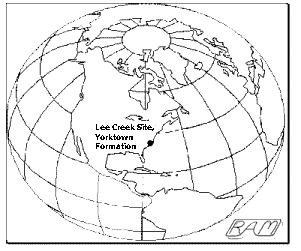Trophic Treasure Trove
Fossil assemblages can reveal much about prehistoric ecosystems. One of the most remarkable fossil assemblages is to be found at the Lee Creek site, a Miocene-Pliocene deposit in eastern North Carolina. Here, giant-toothed sharks, baleen whales (mysticetes), pygmy and dwarf sperm whales (Kogia) are abundant. The Lee Creek fossil site is the subject of on-going studies by the Smithsonian Institution. Smithsonian paleontologist Robert Purdy is focusing his efforts on the Lee Creek sharks, including Megalodon.
During the Pliocene, Lee Creek lay on a submarine embayment where upwelled, nutrient-rich water was drawn far onto the continental shelf. In response, an astonishing assemblage of large marine vertebrates aggregated: Blue Marlin (Makaira nigricans), Tiger (Galeocerdo sp.) and Mako Sharks (Isurus spp.), tunas, cold-water fishes such as Hake (Merluccius bilinearis) and Tilefish (Lopholatilus sp.), marine reptiles like sea turtles and crocodiles, seabirds including the Giant Auk (Alca antiqua), Gannets (Morus atlanticus), Shearwaters (Puffinus sp.), Loons (Gavia sp.), and cormorants, Monk Seals (Monachus sp.), toothed whales (including the more typically oceanic sperm whale), cetothere and modern baleen whales, and Megalodon.
 The Lee Creek site is thus the first fossil record of an area of
"high-use" by marine vertebrates, comparable to the edge of the
continental shelf off Cape Hateras and in the Gulf of Maine today. From deep
gashes on the fossilized bones of Cenozoic whales (especially tail vertebrae
and flipper bones) made by hand-sized, triangular and serrated teeth, it is
believed that megalodon probably fed on these large marine mammals.
The Lee Creek site is thus the first fossil record of an area of
"high-use" by marine vertebrates, comparable to the edge of the
continental shelf off Cape Hateras and in the Gulf of Maine today. From deep
gashes on the fossilized bones of Cenozoic whales (especially tail vertebrae
and flipper bones) made by hand-sized, triangular and serrated teeth, it is
believed that megalodon probably fed on these large marine mammals.
When the Gulf Stream slowed (possibly due to changes in oceanic circulation patterns as the Atlantic widened), it seems that it was no longer strong enough to pull cold, nutrient-rich water up to the surface. In the strata above the Pliocene deposits at Lee Creek, fossil remains of seals, small toothed whales, mako and whaler sharks (family Carcharhinidae) persist. But no baleen whales, sperm whales, or Megalodon fossils have been found.
For these big eaters, the party was over.
